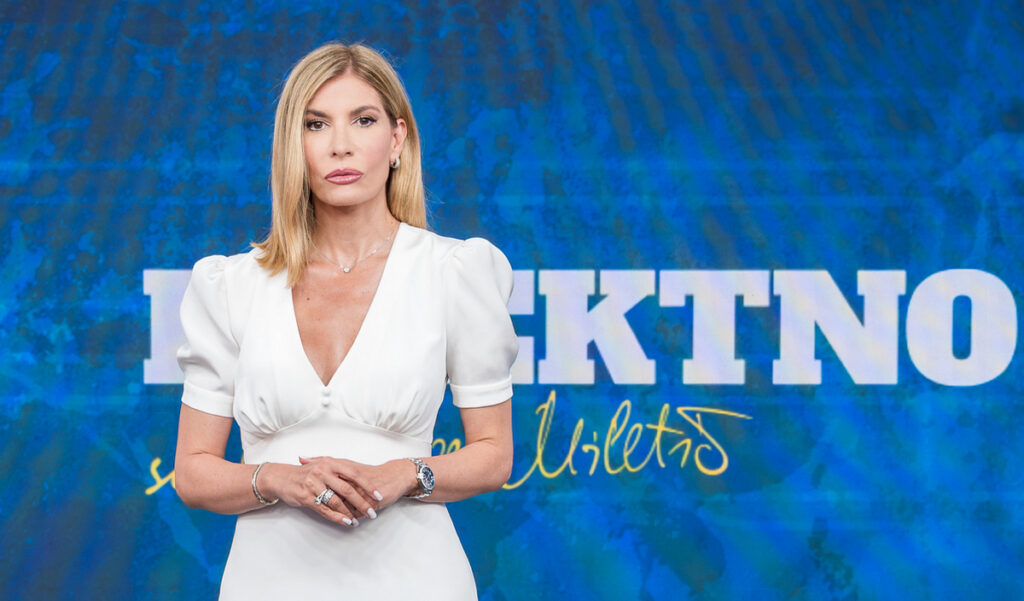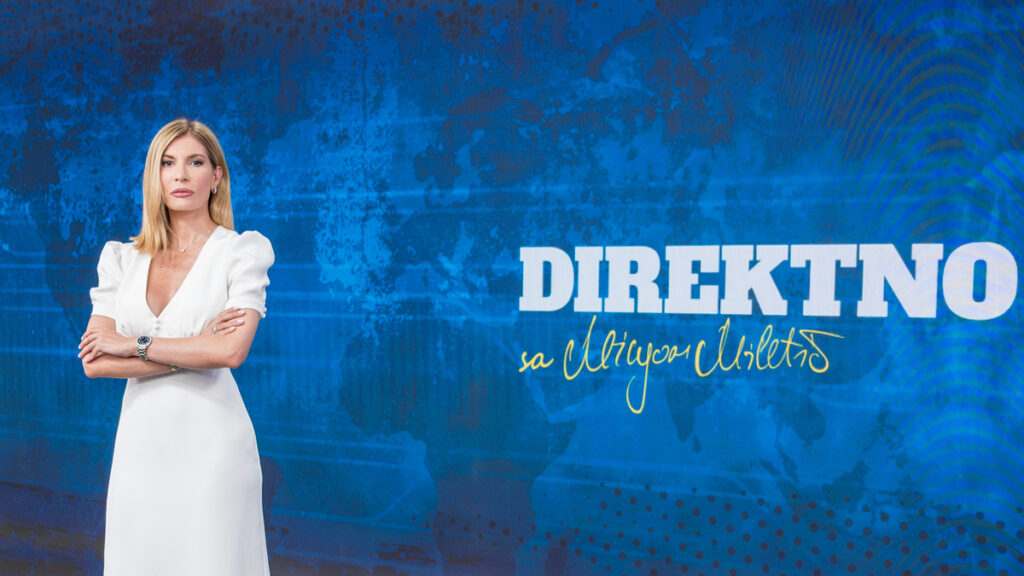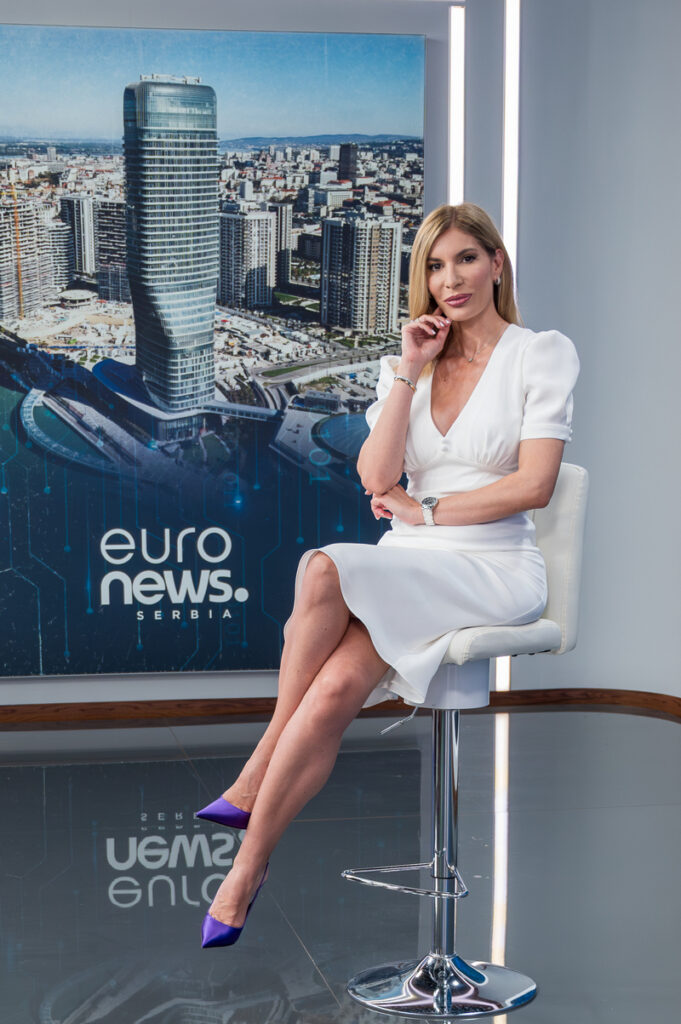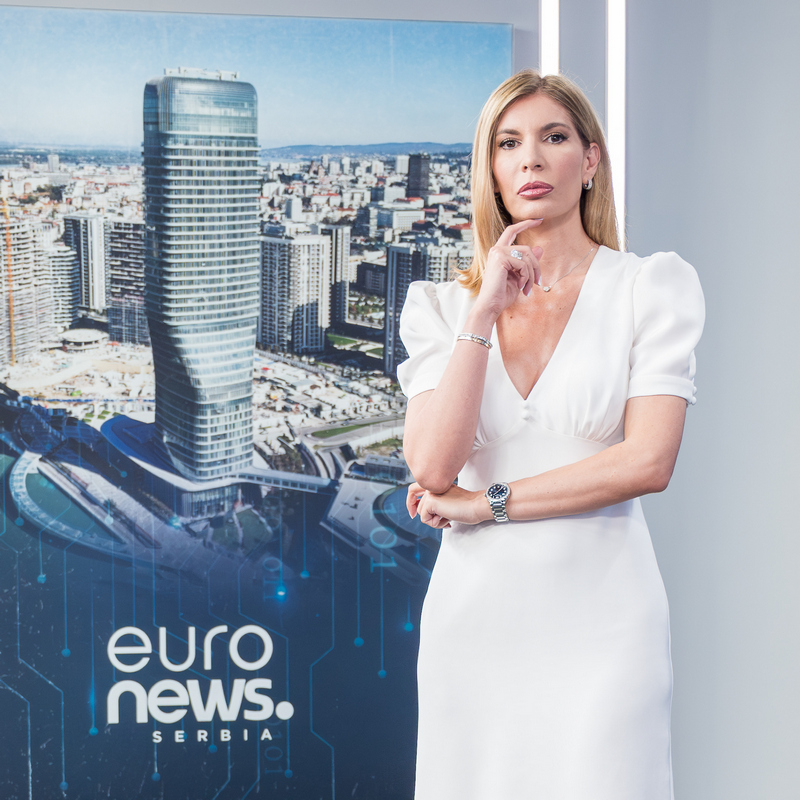How a European news brand is redefining journalism standards across the Western Balkans

In a rapidly changing media environment marked by political pressure, digital disruption, and shifting audience habits, Euronews is striving to maintain editorial independence, professionalism, and credibility. We spoke with Minja Miletić, Regional Director of Euronews for Serbia, Bosnia and Herzegovina, and Montenegro, about the challenges of running a regional newsroom, the responsibility of fact-based journalism, and the network’s growing role in the Western Balkans.
How would you describe your professional journey from a medical doctor to the Regional Director of Euronews?

My career path has not been typical—especially compared to that of most of my colleagues, primarily journalists—but it has certainly been authentic. After graduating from the Faculty of Medicine in Belgrade, I realised I was strongly drawn to the media—partly because I had worked part-time in television during my studies, initially reading news bulletins and then gradually learning to produce reports, conduct fieldwork, investigate, and understand every stage of the journalistic process. I learned through experience, taking on concrete tasks —often under pressure —but with a great desire to master the craft. As you know, journalism is addictive—it’s a calling, not just a profession. A passion that many of the best among us have dedicated their lives to.
That’s precisely why I believe it’s essential to go through every stage of journalism—from basic skills and fieldwork to editing and newsroom management—because only then do you gain a full picture. Formal education is equally important, as it provides breadth, structure, and a sense of responsibility towards knowledge. Although my degree was not directly related to media, medicine taught me to think analytically, to be thorough, and to take public discourse seriously—skills I rely on every day.
When I graduated, it was a difficult time to find work. However, I was offered a permanent position in television, so the transition from medicine to journalism felt like a natural continuation of my quest to understand the world and contribute to society through the questions I ask. Over the years, I built my career as a journalist, presenter, and editor. When I was allowed to lead a television station, I knew it was the moment I had professionally grown into.
Today, as Regional Director of Euronews for Serbia, Bosnia and Herzegovina, and Montenegro, I try to lead the team with the same commitment I brought to every other newsroom role I’ve held. From the outset, the goal of the Euronews Serbia project was clear: to introduce European standards into the local media space and to build trust through accurate and impartial reporting. That goal remains unchanged, but the way we achieve it continues to evolve in line with shifts in the media industry.
Our owners and partners follow global trends and are focused on strengthening our influence by increasing viewership, expanding our regional presence, and prioritising digital platforms that are increasingly shaping how audiences consume news. The world of media is changing faster than ever—and it is our responsibility not only to keep up with these changes, but to understand them, help shape them, and remain true to the values that define us: truth, responsibility, decency, and credibility.

What are the key challenges and lessons you have learned over two decades in the media industry?
I have worked in the media for over 20 years, and during that time, I have faced various challenges—ones that, at their core, have remained the same, even as their form has evolved. At the beginning of my career, I struggled with knowledge, space, and recognition. Later came greater responsibilities and the constant need for personal development.
I believe that journalists grow the most professionally in times of crisis—when information must be accurate, fast, and verified, and when decisions must be made under pressure and without delay. That’s when the team’s strength and leadership skills truly come to the fore. This is exactly what I strive for in my current role, leading the channel together with Editor-in-Chief Dragana Pejović.
Dragana is a seasoned journalist with extensive experience built during her years at the editorial office of NIN, a renowned weekly publication. As editor-in-chief at Euronews Serbia, she has full professional freedom and responsibility to shape the news programme according to the highest standards of relevance, impartiality, and editorial independence, which is the core of the Euronews brand in all of its newsrooms.
One of the greatest challenges today is undoubtedly digital transformation—shifting from traditional broadcasting to multi-platform news delivery, working with data, algorithms, and an audience that is changing rapidly and no longer consumes news in the way it was consumed for decades.
However, I view every shift in the media landscape as an opportunity rather than a threat, provided we are willing to learn, adapt, and remain faithful to the core principles of journalism. Above all, I like to remind both myself and my colleagues that the most important thing is to share a common goal, a shared idea, and a vision.
What motivated you to take on a regional leadership role, and how has it changed your day-to-day work?

When I was offered the opportunity to step into a leadership role—after nearly 25 years in the media—I gave it careful thought, as any responsible person would. Taking on responsibility for people, content, competitiveness, and professional standards was my greatest challenge.
However, I saw it as both an opportunity and a motivation to continue working in media, but from a different perspective: one that involves strategic planning, team development, regional coordination, and upholding the brand’s standards.
At the same time, I have not stepped away from journalism or from hosting programmes, because I believe that direct contact with the audience and with guests makes a real difference. It’s not easy to be a director when, at heart, you’re still a journalist—but in the media world, that’s exactly what makes a good director. The best ones often come from the newsroom.
How does your show “Direktno sa Minjom Miletić” align with the broader mission of Euronews?
“Direktno sa Minjom Miletić” is my way of contributing to public dialogue in Serbia and the region. Although, to be frank, it has become increasingly difficult to maintain a balance between opposing views. We live in a time when audiences often choose media outlets not to become informed, but to reinforce their existing beliefs. The willingness to listen to different or opposing opinions is becoming increasingly rare.
Still, I believe that a journalist’s job is not to cater to the audience, but to build a relationship based on trust, grounded in facts and responsibility. Our connection with the audience cannot and should not be one-sided; it must be reciprocal and built on accountability. Regardless of what the audience may prefer to hear or see at any given moment, our obligation is to remain close to the truth.
In today’s landscape of digital fragmentation and the constant battle for attention, truth and credibility often matter more and have greater long-term value than ratings alone. It is a more difficult path, but it’s the only one that truly matters.
More and more mass media outlets are shifting from a universal approach to targeted content, selecting tone, format, and topics tailored to specific audience expectations. In such an environment, it becomes even more important to preserve spaces where objectivity, diversity, and professionalism are upheld.
In my show, I aim to ask questions that not only demand accountability but also foster understanding, because I believe that is the only path to meaningful dialogue. The programme has now been running for nearly five years, and in my view, it naturally aligns with the broader mission of Euronews: to inform, explain, and give space to diverse voices.
My goal is to create a space for serious conversations about important issues, without sensationalism, populism, or trivialisation. I also try to include political figures from across the region, because I believe their perspectives and arguments deserve to be part of the wider public discourse.
Euronews, both globally and regionally, positions itself as a channel that values professionalism, impartiality, and dialogue—and, as I’m sure you’ll agree, those are rare and precious qualities today. On Euronews Serbia, conversations are open, reasoned, and respectful towards both the guests and the audience. I believe that this is the value journalism must continue to uphold—now and in the years ahead.
What do you expect from Euronews’ regional expansion? What are the main goals of launching channels in Bosnia and Herzegovina and Montenegro?
Our goal is not to deliver a single “truth,” but to provide accurate, verified, and timely information, along with a range of perspectives. In Bosnia and Herzegovina and Montenegro, we have established newsrooms composed of outstanding journalists and editors whose content respects the local context while adhering to European standards.
Audience feedback makes it clear that people recognise professionalism and value information that is free from manipulation, especially in the complex political environments that both Bosnia and Herzegovina and Montenegro face.
We are very pleased with how Euronews BiH is performing so far. We receive daily reports, and it’s clear that viewers in Bosnia and Herzegovina perceive us as a channel that informs rather than imposes conclusions, allowing the audience to form their own opinions. Our reports are being cited, and our news is being followed closely. We certainly aim to expand the programme offering in the future.
Montenegro is also ready to launch, and we expect strong results there as well. The team selected is highly motivated and eager to contribute to a brand like Euronews.
Moreover, Euronews Serbia already enjoys a loyal audience across the region—an encouraging foundation for continued growth and deeper engagement throughout the Western Balkans.
How does Euronews position itself in relation to other regional and international news channels?
Euronews positions itself as a European news channel guided by the principles of accuracy, balance, and reasoned reporting. Unlike many regional broadcasters that are often clearly aligned with specific political positions—such as N1, which is widely perceived as opposition-oriented, or RTS, which carries the burden of state influence—Euronews strives to maintain a neutral stance and credibility. That is a particularly demanding, yet essential, task in this media environment.
Compared to major global networks like CNN or the BBC, Euronews offers a distinctly European perspective—closer to our region—and provides more space for local and regional issues, while maintaining the scope and standards of international journalism.
Euronews serves as a bridge between the global and the local—a place where Serbia and the wider Balkans are presented within a broader context, while still being given space and a voice. Our goal is not to be the loudest, but the most reliable.
Euronews Serbia has recently gone through turbulent times. Several former employees claimed they were dismissed because of their views about the company you led. Could you provide more information about this, particularly in light of the statements made by NUNS and UNS?
In every large newsroom, there are difficult decisions to be made. In this case, it was strictly a matter of organisational changes and job rationalisation. No decision was made based on any employee’s personal views—it was about operational efficiency. If that had not been the case, more people would have been let go.
Unfortunately, some chose to politicise the matter. Euronews Serbia respects the right to individual opinion, but it also demands professionalism, ethical conduct, and a team-oriented culture. I am open to dialogue, but not to manipulation.
I believe we were the only newsroom to broadcast a statement from a group of our employees who disagreed with management’s position over two full days, in prime-time news. Can you name another media outlet in the world that would do that? I am proud of it because it demonstrates Euronews’ commitment to pluralism of opinion.
Ultimately, we all shared the same goal at the time: to defend our colleagues at RTS. We remain the only newsroom in Serbia that publicly, and on two separate occasions, called for the unblocking of the public broadcaster.
The Euronews leadership made every effort to minimise the number of redundancies. The entire process was transparent and announced in advance, and aligned with the broader “Digital First” strategy launched by our central office two years ago. Layoffs have occurred in other media outlets as well, even before ours. N1, for instance, has seen job cuts in both Bosnia and Croatia, and here in Serbia, other outlets are currently undergoing similar processes. Yet media associations remain silent. Why?
I’ve read allegations about a so-called purge at Euronews. But anyone who watches our programming can see there is no basis for such claims. As Director, I have never received a single formal complaint from staff about censorship. And yet I suddenly began reading accusations of repression, without any evidence, and coming from individuals who lost their jobs due to poor performance.
There’s an important rule in journalism: if you’re experiencing pressure, you report it immediately—or never. Speaking about it a year later either means you accepted it or that your claims lack moral credibility, or both.
What we ask of our journalists at Euronews is to meet professional standards. Why certain political and business groups tried to target our channel and manipulate public perception—while serious violations of labour rights and journalistic codes are tolerated elsewhere—is a question for them, for the journalist associations, and for competing media outlets they cooperate with.
With sincere regret, I must say that the two largest journalist associations in Serbia—especially in recent months, though not exclusively—have strayed significantly from their role as impartial and credible voices in the media space. They spent weeks echoing unverified claims about Euronews, without ever attempting to hear the other side. We do not publish falsehoods, and we do not respond to them.
How are topics and guests selected for Euronews programmes?
I do not interfere with editorial decisions or the selection of guests. However, I am in daily communication with our Editor-in-Chief, Dragana Pejović, whom I trust fully, as well as the trust of our employer and the Euronews central office.
Topics are chosen based on their relevance and timeliness, and through discussions at daily editorial meetings, just as in any other media outlet, but with significantly more freedom of thought and greater openness to diverse viewpoints and suggestions. I know this from personal experience in other media environments.
The editorial policy of Euronews—which I helped shape through the selection of the editor-in-chief and in other ways—is clear: we focus on issues relevant to our society, without sensationalism, and we choose guests based on their expertise, influence, and responsibility in decision-making processes. Credibility is essential, just as it always has been in media outlets that value their reputation with the public.
Of course, some politicians refuse to appear on our programmes, only to later claim that media freedom does not exist. That is beyond our control as journalists and editors.
I often state openly in my programmes who was invited and why they declined to participate—because our viewers expect to hear all sides, and I believe I must be transparent about that. It is one of the most difficult tasks today—bringing together two or even three different perspectives—but we will not give up on it.
The European Commission and the Media Freedom Rapid Response (MFRR) have recently raised concerns about political pressure, censorship, SLAPP lawsuits, and attacks on journalists in Serbia. How do you respond to these findings, and do you believe Euronews Serbia upholds European standards of media freedom?
The European Commission has selected Euronews as an official partner for communicating EU-related content. Euronews Serbia is part of this trusted European network, and I believe it’s important to emphasise that, as it reflects the credibility we’ve earned from both European institutions and the professional public.
As a journalist, I believe professional ethics require us to begin with facts before concluding any report, including those from the European Commission.
When it comes to the views of European media professionals, I can share my personal experience. Euronews operates newsrooms across Europe and the world, and I am in regular contact with colleagues from the highest levels of the organisation. These are some of the most respected professionals in the industry, and interestingly, the restriction of media freedom in Serbia has never once been raised as a concern in our conversations.
On the contrary, their questions often focus on how such a diverse media landscape can exist in a single market, from Euronews, Al Jazeera, and Radio Free Europe, to Russia Today. That pluralism is rightly seen as a strength.
As for the MFRR initiative, I first became aware of it recently when they invited me to a meeting, which I gladly accepted. I later reviewed the report they produced, and I must say that I was somewhat surprised by its content, primarily due to certain ambiguities, a lack of depth, and how information was presented. It seemed to me that with a more thorough approach and broader consultation with relevant sources, a more complete and balanced picture could have emerged.
What stood out most was that, in preparing such a serious document, the authors had not consulted with key institutions—such as the police or the Prosecutor’s Office for High-Tech Crime—before concluding that attacks on journalists via social media were likely.
Furthermore, the list of journalists said to have been targeted included individuals who, unfortunately, have themselves been known to publicly target others—a practice that should not be normalised.
I firmly believe that for all of us working in media, it is vital to strive for professionalism, balance, and fact-based reporting—especially when addressing sensitive topics such as journalist safety and freedom of expression.
I remain open to cooperation and dialogue, but I also believe that any serious conversation about media freedom must be grounded in accuracy, fairness, and context.
How do you envision Euronews five years from now, in terms of content, audience, and impact?
I see Euronews Serbia as a multimedia platform that connects the region, delivers accurate information, and empowers citizens through knowledge. My ambition is for us to become the first choice for those seeking reliable news—a medium that people turn to not just to find out what happened, but to understand why it happened.
Starting this autumn, we will introduce new formats and further strengthen our engagement with audiences through social media and other digital channels. These digital formats, of course, cannot exist without quality television content, but we are determined not to fall behind the times. We want the next generation of Euronews viewers to come from the digital space.
In five years, I hope we will have evolved into a fully integrated platform, relevant on both TV screens and mobile devices. Our audience is already diverse, comprising both young and old, as well as individuals who seek accurate information and expect every piece of content we produce to offer genuine insight.
We are also considering the launch of an additional channel in another neighbouring country. Euronews is already experiencing strong growth and impact in Serbia and Bosnia and Herzegovina, and I believe Montenegro will follow a similar path. In the years to come, our aim is to be recognised as a shared European broadcaster for the Western Balkans—one that respects local differences, while promoting universal values.